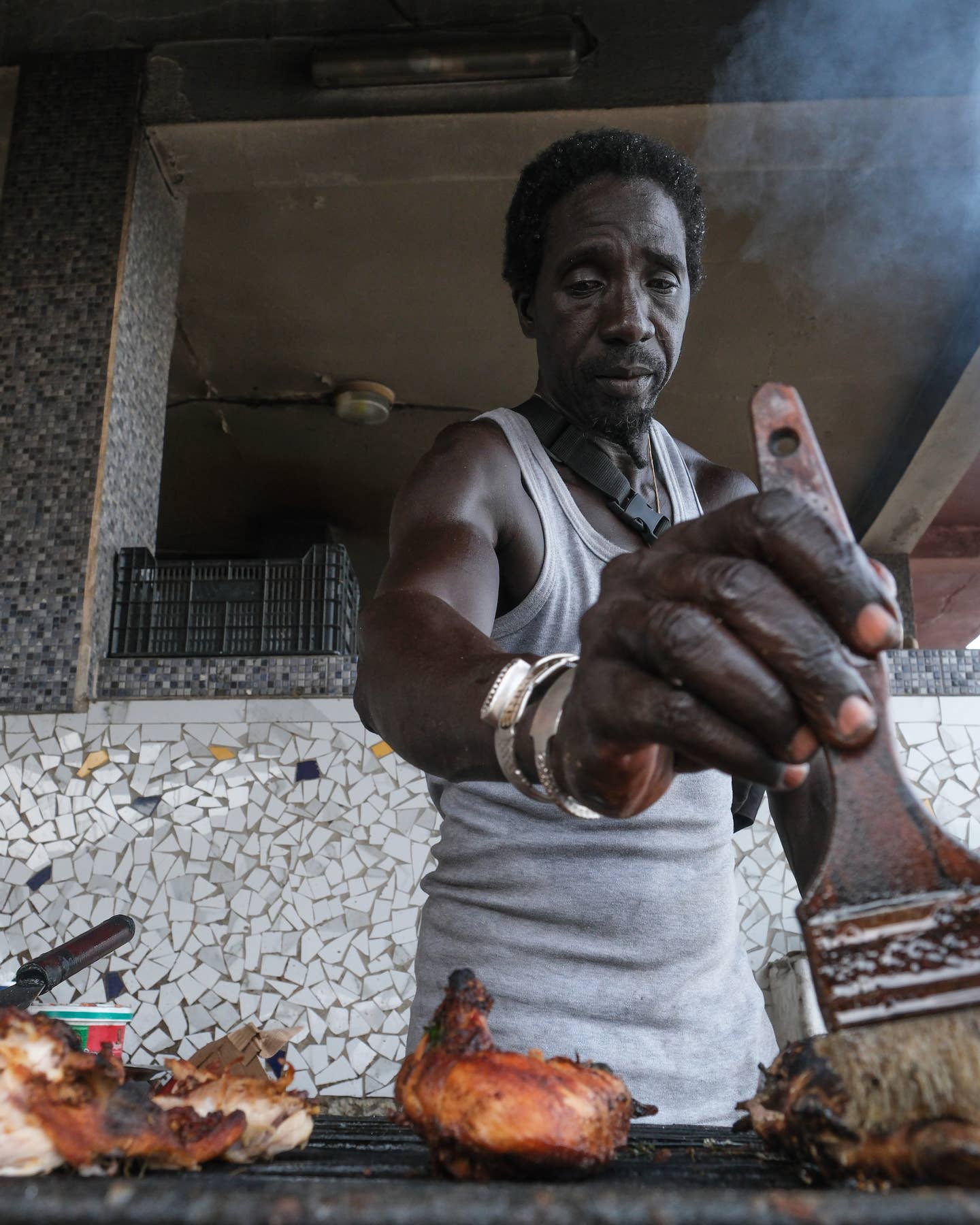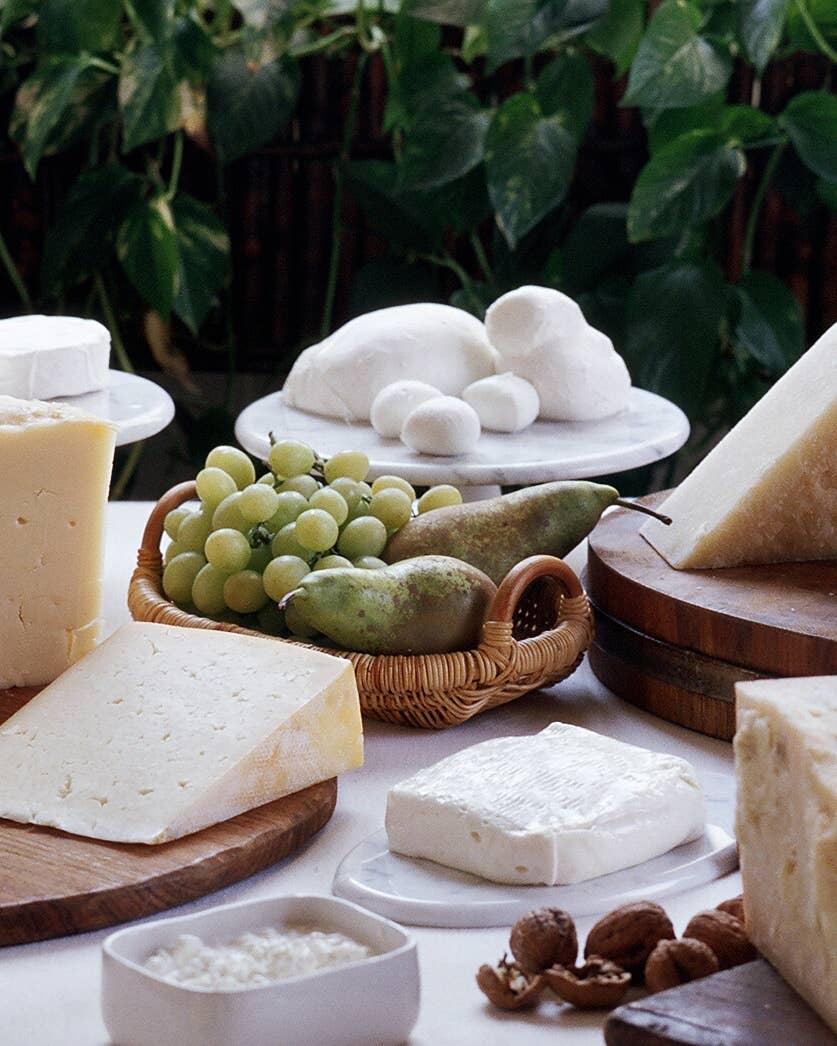
Real-Life Cuisine
Jacques Maximin is looking for his chicken. He darts out of the kitchen into the dining room at his restaurant in Vence, a wiry, dark-haired man with not so much a scowl as a look of dark, ironic worry seemingly frozen on his face. "Ou est le poulet?" he demands, of no one and of everyone. He is met with shrugs. Uncertainty doesn't interest him. Back into the kitchen he darts.
The chicken that Maximin is seeking, it must be explained, is not one destined for the oven or the stewpot. It is a pet, one of a score or more barnyard fowl that live in a pen behind one of the buildings on the property, in deceptively calm proximity to the seven or eight dogs of assorted size and provenance who share the premises. Between meal services, it is not uncommon to find fowl or dog or both lounging in some corner of the restaurant or of the terrace just outside. Indeed, a few minutes later, the missing bird is discovered scratching at a patch of dry earth near a clump of scarlet canna not far from the restaurant's front entrance. Maximin appears, scoops the chicken up into his arms, and soothes it as he carries it towards its pen. He doesn't quite smile, but his brow smooths slightly as he goes. It is as if the chicken is his talisman—a feathered metaphor for the simple life he has found for himself after so many complicated years; a reminder and a reassurance to him that he has at last come home.
Jacques Maximin is one of the most celebrated and notorious chefs in France—celebrated for his prodigious talents, notorious for his moods, his unpredictability. Born in 1948 in Rang-du-Fliers, in the rainy northern French province of Pas-de-Calais, he began his apprenticeship at 13, working his way through a succession of kitchens while perfecting his craft. It wasn't until he reached La Bonne Auberge in Antibes in 1975, however, that he saw his future clearly. Until that moment, he later said, "I hadn't known that one had the right to create one's own cuisine." Hired in 1978 as chef de cuisine for Chantecler, the dining room at the Hotel Negresco in Nice, Maximin made up for lost time, quickly winning critical attention for the audacity and skill with which he invented new dishes—a terrine of green garlic set into rich chicken-stock gelee; "ravioli" made of thin wisps of turnip, stuffed with meltingly sweet duck mousse. There was a "Watch this!" aspect to much of what he cooked, but he was a daredevil who nearly always landed on his feet.
He was also a tyrant in the kitchen, it was said. He refused to participate in what he felt were mindless public relations events. He wouldn't pander to the rich Americans who patronized the Negresco. The Gault Millau guide called him "le Bonaparte des fourneaux" (the Bonaparte of the ovens) and "l'impossible Maximin". The Guide Michelin repeatedly refused to grant him the third star that nearly everybody agreed he deserved.
In 1989, to no one's great surprise, Maximin set out on his own. What did surprise some was the scale on which he did it. Taking over a 39,000-square-foot former theatre in the center of Nice (it had once housed the local Folies Bergere), he embellished it with custom-made furnishings and with sculptures by Cesar, Arman, and other noted artists of the region. He installed the kitchen on the stage, behind glass and a heavy gold-trimmed red velvet curtain, and the curtain rose with solemn sluggishness after dinner, so that the kitchen team could take a bow. The food was pure, high-tone Maximin, but the whole experience seemed like '80s excess, and the '80s were almost gone.
Maximin's theatre lasted barely three years. After it closed, he turned to consulting, lending his culinary expertise to a number of clients—among them a chain of casinos. There were rumors that he had turned his back on haute cuisine. There was talk that he had been eclipsed by another young star chef in the region, Alain Ducasse. Some said that he had given up. It was not without skepticism, then, that the French gastronomic establishment greeted the news, early last year, that Maximin planned to open a modest new restaurant of his own, on the ground floor of his house in Vence —a handsome hill town about a dozen miles from Nice. And it is not without some trepidation that we approach the place, Restaurant Jacques Maximin, for dinner one evening last May, shortly after it had opened.
Behind shrub-shrouded gates, we find a pretty Provençal-style house surrounded by greenery and framed by wisteria and bougainvillea. The dining room has faintly yellow walls with antiqued gray-green trim, tile floors, and a beautiful old oven with a stone griddle on one wall. We order what turns out to be a simple meal, but with small elevating and transforming touches—to begin with, impeccable violet asparagus with a textbook vinaigrette and a serving of six little pageot, one of the most flavorful of Mediterranean fish, perfectly fried in a light, even crust; then a tian d'agneau (slices of rare lamb draped over a mound of ratatouille-like vegetables) and half a roasted pigeon with lentils —no tricks but the one of cooking things exactly right. Desserts, on the other hand, are show-offs: a flat "pizzetta" of sweetened pastry crust spread with pureed rhubarb and topped with thin slices of apple—a tart-sweet marvel—and an Arabian Nights fantasy of candied baby eggplant with ginger-scented eggplant ice cream, earthy and elegant and mysterious all at once.
The next day, we return for lunch—more violet asparagus; small zucchini flowers stuffed with zucchini mousse in truffle sauce; a salad of red mullet sauteed with baby artichokes and rosy garlic; and lobster and roast pigeon with miniature potatoes—and to talk with "l'impossible Maximin". It turns out, of course, that he isn't impossible at all; he's just intense, impatient, passionate about what he does, surprisingly shy, and unexpectedly sensible. We sit on his terrace, surrounded by a lush thicket of meridional vegetation, as he tells us how he ended up here. "I was born in the north by chance," he says. "Provence is my region. I make cuisine from my head, always with the flavors of the south in mind. But the restaurant business has changed. The Americans who come to Europe aren't stupid. They do their research. They're prepared. For 15 years, they were deceived in France, and eventually they figured that they could eat better in Italy for much less. Now the restaurateurs are crying. It's time for us to realize that the clientele has changed. Nobody wants to pay any more for the investments of the restaurateurs. I own this place. This is my house, a real Provençal house, 120 years old. I'm making high-quality food at low prices. A three-course menu here costs 240 francs; that was the price of a single appetizer at Chantecler. I've lived here for 12 years already, and I've always dreamed of doing this. This is my life, my real life."
Four months later, we return to Maximin for lunch—not for work but purely for pleasure. We order three appetizers apiece. The first dish to arrive is a hayrick of crisp haricots verts tossed in a light tomato-spiked cream dressing with fresh hazelnuts scattered across the top. It is absolutely simple, supremely confident—and so good we shake our heads in pleased amazement. Then there's a shellfish soup—a rich, almost brick-red reduction of sea flavors, crunchy with shredded carrots, leeks, and celery, and enriched with two half-moon-shaped ravioli filled with tiny crayfish; fresh plump white beans gratineed with cream and herbs; an assortment of tiny fish and a few pieces of squid exquisitely deep-fried and served with a faintly spicy fresh tomato sauce; more white beans, this time with the very small squid called pistes and a sauce made from squid ink cut with lemon juice and shredded basil; and ridged-shell scallops, or petoncles, on the half shell, stuffed with bread crumbs and herbs and quickly broiled—simple perfection yet again. Instead of dessert this time, we finish with cheeses from the Niçois backcountry. It is one of those rare, impeccable meals that manages to be accessible and intelligent and unfailingly delicious all at once. We'll remember it for years, longingly.
There is no sign of Maximin as we eat. We find him later in back of the house, shirtless, tacking up with manic energy the wisteria against a stone wall. He nods a bare acknowledgment to us across the lawn. Then he goes back to work, living his real life.
Keep Reading
Continue to Next Story










